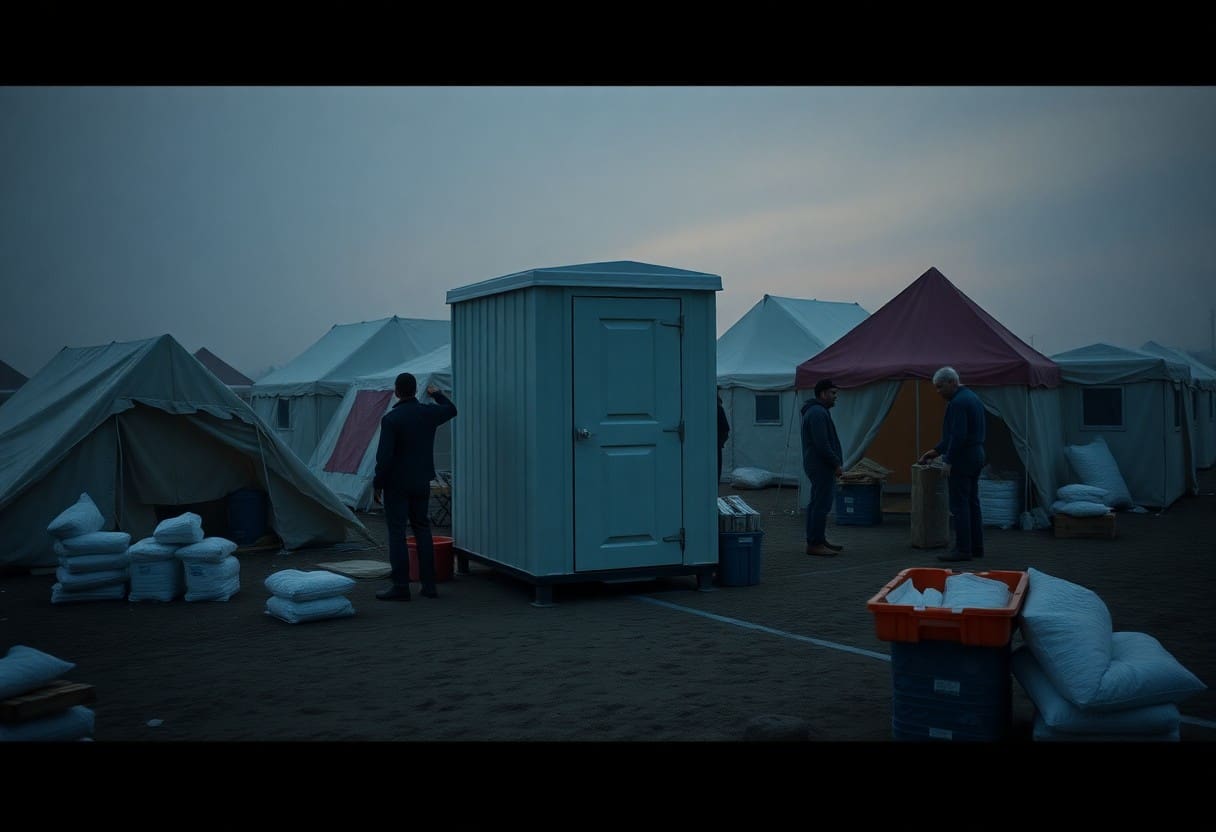In times of disaster, ensuring the health and well-being of affected populations is paramount. One crucial yet often overlooked aspect of disaster relief is the provision of adequate sanitation facilities. Portable restrooms play a vital role in maintaining hygiene, preventing disease outbreaks, and providing a semblance of normalcy in chaotic situations. This article delves into the indispensable role of portable restrooms in disaster relief, offering a comprehensive analysis that surpasses the competition in depth and detail.
The Importance of Sanitation in Disaster Relief
Health and Hygiene
Sanitation is a cornerstone of public health, especially during emergencies. Poor sanitation can lead to the spread of diseases such as cholera, dysentery, and typhoid fever. According to the World Health Organization (WHO), approximately 2.2 million people die annually from diarrheal diseases, many of which are preventable with proper sanitation. Portable restrooms help mitigate these risks by providing safe and hygienic waste disposal options.
Dignity and Psychological Comfort
Beyond physical health, access to clean and private sanitation facilities helps maintain human dignity. In disaster-stricken areas, where people have lost their homes and belongings, the availability of portable restrooms can provide a sense of normalcy and privacy. This psychological comfort is essential for the mental well-being of survivors.
Deployment of Portable Restrooms in Disaster Zones
Rapid Mobilization and Setup
Portable restrooms are designed for quick deployment and setup, making them ideal for emergency situations. Their mobility allows relief organizations to transport and install these units in affected areas swiftly. The Federal Emergency Management Agency (FEMA) and other emergency response teams often prioritize the deployment of portable restrooms alongside food, water, and medical supplies.
Scalability and Flexibility
One of the key advantages of portable restrooms is their scalability. Depending on the size and needs of the affected population, units can be added or removed easily. They come in various configurations, from basic single units to larger trailers with multiple stalls, sinks, and even showers. This flexibility ensures that the sanitation needs of different disaster scenarios can be met effectively.
Technological Advancements in Portable Restrooms
Water Conservation and Eco-Friendly Designs
Modern portable restrooms are equipped with advanced technologies aimed at conserving water and minimizing environmental impact. For instance, vacuum flush systems, like those used by Jets™, require significantly less water per flush compared to traditional toilets. Such innovations are crucial in disaster zones where water supply might be limited.
Solar-Powered Units
Solar-powered portable restrooms are another significant advancement. These units can operate independently of external power sources, making them ideal for remote or severely damaged areas. Solar panels provide energy for lighting, ventilation, and even hand-washing stations, ensuring that sanitation facilities remain functional under challenging conditions.
Advanced Waste Management Systems
Innovative waste management systems in portable restrooms enhance their efficiency and hygiene. For example, bio-digesters and chemical treatments can break down waste more effectively, reducing odors and health risks. These systems also facilitate easier waste removal and disposal, which is critical in maintaining sanitary conditions in disaster zones.
Case Studies: Portable Restrooms in Action
Hurricane Katrina (2005)
Hurricane Katrina, one of the most devastating natural disasters in U.S. history, highlighted the importance of portable restrooms in disaster relief. In the aftermath, relief organizations deployed thousands of portable toilets to the affected areas. These units provided essential sanitation services to displaced residents and emergency responders, helping to prevent the spread of disease in overcrowded shelters.
Haiti Earthquake (2010)
The 2010 earthquake in Haiti displaced millions of people and destroyed critical infrastructure, including sanitation facilities. Portable restrooms were quickly deployed by international aid organizations to provide much-needed relief. The ability to rapidly set up sanitation facilities was crucial in preventing major outbreaks of waterborne diseases in the densely populated camps.
COVID-19 Pandemic
During the COVID-19 pandemic, portable restrooms played a vital role in supporting healthcare facilities and testing centers. In many cases, these units were equipped with additional hand-washing stations and sanitizers to help control the spread of the virus. Their deployment in temporary hospitals and quarantine centers underscored their versatility in various emergency scenarios.
Challenges and Solutions
Logistical Challenges
Deploying portable restrooms in disaster zones presents logistical challenges, such as transportation, installation, and maintenance. These issues can be exacerbated by damaged infrastructure and limited access to affected areas. Solutions include pre-positioning portable restrooms in disaster-prone regions and training local teams in their setup and maintenance.
Cultural Considerations
Cultural factors can influence the acceptance and use of portable restrooms. For instance, in some cultures, gender-segregated facilities are essential. Relief organizations must be sensitive to these cultural norms and provide appropriate solutions to ensure the effectiveness of sanitation interventions.
Sustainability and Waste Disposal
Disposing of waste in an environmentally sustainable manner is another challenge. Portable restrooms must be serviced regularly to remove waste and replenish supplies. Employing eco-friendly waste treatment technologies and partnering with local waste management services can help address these issues.
Portable restrooms are a critical component of disaster relief efforts, ensuring the health, dignity, and well-being of affected populations. Advances in technology have made these units more efficient, sustainable, and adaptable to various emergency scenarios. By understanding and addressing the logistical and cultural challenges, relief organizations can optimize the deployment of portable restrooms and enhance their impact.
Alpha Mobile Solutions is at the forefront of providing innovative and reliable portable restrooms for disaster relief. With a commitment to quality, sustainability, and rapid response, Alpha Mobile Solutions ensures that essential sanitation services are available when and where they are needed most.
For more information on our portable restroom solutions and how we can assist in disaster relief efforts, visit Alpha Mobile Solutions.



